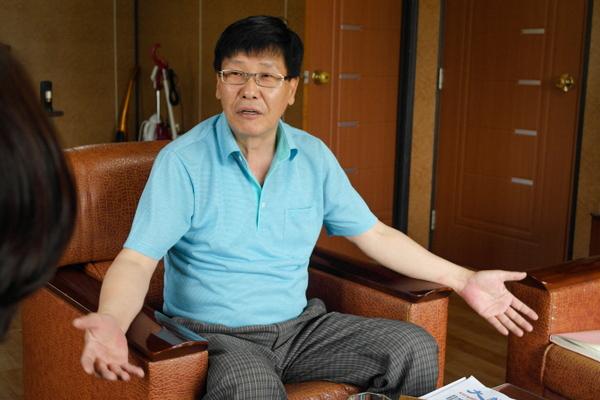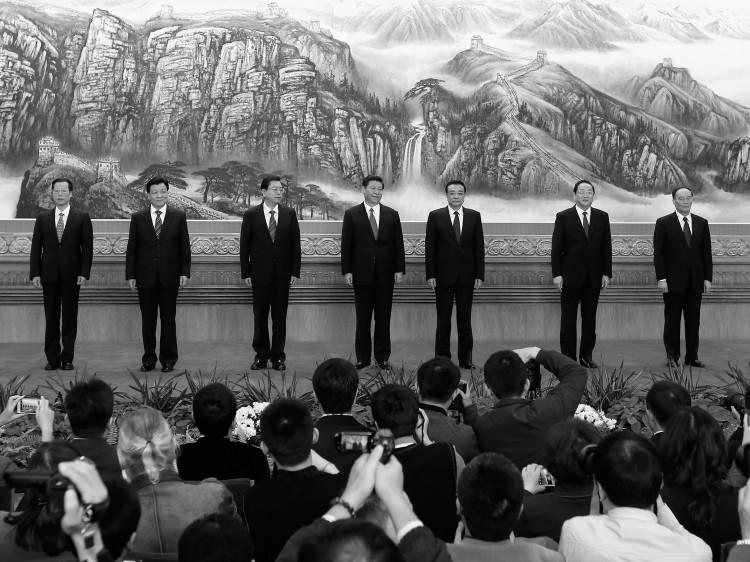A former vice premier of China’s State Council has drawn some unflattering attention during an exhibition of his calligraphy and other artworks at the Calligraphy Art Museum in Seoul, South Korea. His record of torture, crimes against humanity, and genocide has been exposed.
Dr. Choi Woo-Won, professor of philosophy at the Pusan National University, sounded an alarm when he learned of this exhibition, issuing a statement saying: “A person who has committed crimes against humanity has an art exhibit at the best art venue of South Korea to showcase his so-called works of calligraphy and seal cutting. South Koreans must be indignant when they learn this!
“Li Lanqing’s crimes are even more inhumane than those committed by war criminals tried in various international war crime tribunals. Who organized such an ‘art exhibit’ and for what purpose? It is ridiculous! We all should go to the Seoul Arts Center to condemn this exhibition and stop it!”
The exhibit of Li Lanqing’s calligraphy and seal-cutting works, which runs through Dec. 8, was organized by the Chinese Embassy, and Chinese ambassador to South Korea Zhang Xinsen attended the opening ceremony.
Li Lanqing himself did not attend. Li is one of over a hundred high-level Chinese officials who are on international watch lists for human rights abuses and crimes against humanity. Some of them have been sued in overseas courts and dare not travel abroad for fear of being served court papers, facing groups of protesters, or being arrested.
Despite Li’s absence, the event drew the attention of local Falun Gong (also known as Falun Dafa) practitioners who said Li has a lot of blood on his hands.
“Li is a human rights abuser who has been sued in several countries for crimes of torture and genocide, and his being featured in an art exhibit is inappropriate,” a representative for the South Korea Falun Dafa Association said during a press conference in front of the Chinese Embassy on Nov. 18.
610 Office
Li is the former head of the Chinese Communist Party’s 610 Office, a Gestapo-like agency established on June 10, 1999, by former paramount leader Jiang Zemin to spearhead the persecution of Falun Gong.
The traditional spiritual practice of Falun Gong was first publicly introduced in China in 1992. Including meditative exercises and teachings based on the principles of truthfulness, compassion, and tolerance, Falun Gong became immensely popular. By 1999, between 70 million and 100 million people had taken up the practice in China, causing Jiang Zemin to fear that he was losing control over the Chinese people.
Li was the first chief of the 610 Office, also known as the Falun Gong Control Office. From 1999 to 2003, he was in charge of the nationwide campaign against Falun Gong. Under Li’s direction the 610 Office was established at every level of the Party, as well as in state agencies, universities, and major corporations, according to a report by the World Organization to Investigate the Persecution of Falun Gong (WOIPFG).
In public, Li Lanqing issued many reports and made many speeches inciting hatred against Falun Gong, according to the Falun Dafa Information Center.
Behind the scenes, Li helped set the machinery of persecution in motion.
During a 610 Office conference held on Nov. 30, 1999, Li Lanqing verbally relayed a new policy from Jiang Zemin regarding the practitioners of Falun Gong. Li told the conference the 610 Office should “defame their reputations, bankrupt them financially, and destroy them physically,” according to Minghui.org, a Falun Gong website that publishes first person accounts by practitioners of persecution, along with other reports.
The regime began rewarding officials for putting the new policy into action, as documented in a WOIPFG report on Masanjia Labor Camp.
Seminars were held on torture methods deemed especially effective at “transforming” Falun Gong practitioners—causing them to renounce their faith.
For instance, according to a WOIPFG report, “A secret document issued by the Central 610 Office and the Ministry of Justice” reported that “by November 2000 there had been 31 groups of total 500 people from 25 provinces [who] traveled to Masanjia Labor Camp for study tours” for the purpose of learning torture methods.
Li’s 610 Office also promulgated to officials a new policy that “deaths would be counted as suicide,” according to Minghui.
With a policy guaranteeing immunity from prosecution for mistreating practitioners, a policy urging officials to “destroy them physically,” how-to sessions on how to cause excruciating pain, and rewards for “transforming” practitioners, a regime of torture and abuse took shape all across China.
Deaths
The resulting persecution has affected tens of millions of practitioners and their families.
According to Minghui, 3,733 Falun Gong practitioners have been confirmed as of Dec. 2 as having died due to the persecution. Minghui points out that due to the difficulty of getting information out of China, the actual number of deaths is far higher.
Independent investigators have estimated that tens of thousands of practitioners have been killed for the purpose of having their organs extracted and sold in the lucrative organ trade. Writer/researcher Ethan Gutmann, in the 2012 book State Organs, estimated that approximately 65,000 Falun Gong practitioners were killed for their organs between 2000 and 2008, selected from about 1.2 million of them interned in China’s forced labor camp system.
Former Canadian Member of Parliament David Kilgour and Canadian human rights attorney David Matas come to similar conclusions in their investigation report Bloody Harvest, stating that 41,500 organs from Falun Gong prisoners of conscience were sold between 2001 and 2005 alone. The appalling commerce continues today, they say.
Lawsuits have been brought against Li Lanqing in the United States, France, Belgium, Taiwan, Germany, Canada, New Zealand, Chile, Holland, Japan, and Switzerland for crimes against humanity, torture, and genocide against Falun Gong.
The Royal Canadian Mounted Police has put Li Lanqing on its “watch list,” together with Jiang Zemin, Luo Gan, Liu Jing, and ousted former Politburo member Bo Xilai, who is serving a life sentence for other crimes. The Mounties say they will investigate these individuals’ crimes, should they set foot on Canadian soil.
Amateur
Li has been attempting to get his artwork shown at top venues around the world, with varying results. In 2012, Li attempted to have his seal-carvings exhibited at the Metropolitan Museum of Art in New York City.
According to Hong Kong’s Investigate magazine, Chinese authorities contacted a manager of Asian art at the museum, offering “favorable conditions” in exchange for an exhibition of Li’s works. The museum declined the offer because a group of experts who assessed Li’s works considered them of amateur level quality.
Translated by Euly Luo and John Wang. Written in English by Gisela Sommer.
Read the original Chinese article.



